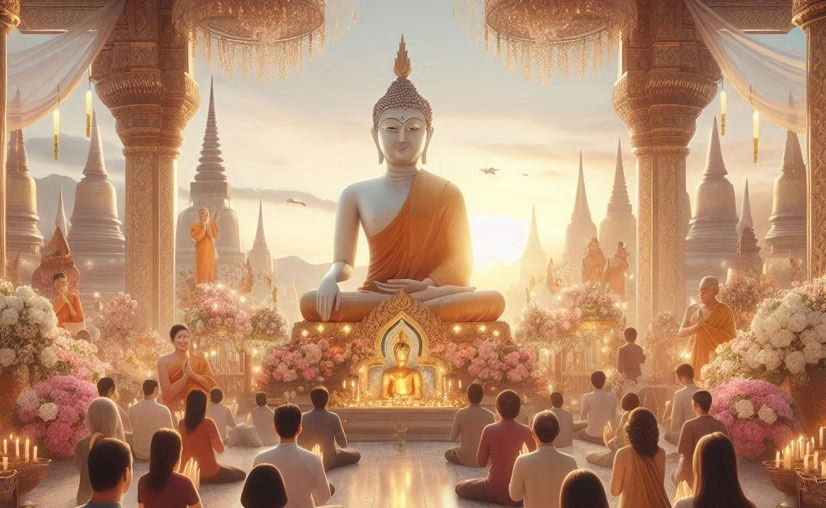
What is Buddha Purnima? A Celebration of Enlightenment and Compassion
Featured Snippet Summary: The Buddha Purnima or Vesak festival honors Gautama Buddha’s birth and enlightenment and his entry into Parinirvana during the full moon of Vaisakha through practices of peace and compassion and acts of charity.
Introduction: Understanding Buddha Purnima
Buddha Purnima, also known as Vesak or Buddha Jayanti, marks the sacred Buddhist celebration of Gautama Buddha’s birth, enlightenment and his passing into Parinirvana. The full moon day of Vaisakha (usually May) marks Buddha Purnima which brings millions of people together globally for solemn reflection and worship. What is Buddha Purnima? The festival provides an opportunity to practice Buddha’s principles of compassion and peace through meditation and charitable activities while participating in community gatherings to support the journey towards enlightenment.
Related Keywords: Vesak, Buddha Jayanti, enlightenment, compassion, mindfulness.
Significance of Buddha Purnima
Buddha Purnima represents significant spiritual meaning and universal importance because it marks three essential events from Buddha’s life. Through its emphasis on the Four Noble Truths and Eightfold Path practitioners find guidance for ending suffering and achieving Nirvana. The festival builds peace and compassion while supporting interfaith unity and shared kindness values. This public holiday prompts various nations to engage together in thoughtful reflection about harmonious living.
Source: The Buddhist Society emphasizes Buddha Purnima’s influence on the promotion of universal compassion.
Historical Background
The origins of Buddha Purnima date back to ancient India because Siddhartha Gautama was born near Lumbini in Nepal around 563 BCE. He discarded his princely life to achieve enlightenment beneath Bodhi tree in Bodh Gaya before reaching Parinirvana in Kushinagar. The earliest Buddhist councils established the festival to protect his teachings which maintained their core essence as they spread throughout Asia and adapted to multiple cultures.
External Link: Explore Lumbini’s significance at UNESCO.
Rituals and Traditions
The Buddha Purnima festival exhibits a variety of rituals that demonstrate core Buddhist principles.
- Temple Visits: Through offerings of prayers alongside flowers and both incense and candles Buddhists express their understanding of impermanence.
- Meditation and Chanting: Mindfulness exercises and the recitation of texts such as the Metta Sutta are central to these sessions.
- Acts of Charity: The act of giving to those in need or setting animals free represents compassionate behavior.
- Processions: Buddha’s teachings reach communities through candlelit walks and cultural performances.
These practices strengthen ties between spiritual life and community relationships.
Global Celebrations
Buddha Purnima celebrations differ among cultures yet create a shared experience for Buddhists around the globe.
- India: Bodh Gaya and Sarnath attract pilgrims who attend ceremonies and participate in prayers.
- Sri Lanka: During Vesak in Sri Lanka people celebrate with lantern displays Vesak Pandols and public almsgiving since it is a national holiday.
- Thailand: The release of sky lanterns during candlelit processions in Thailand represents wisdom.
- Western Countries: Diverse audiences participate in meditation retreats and enjoy Dharma talks.
These celebrations highlight Buddha’s universal teachings.
Buddha’s Teachings Today
The Four Noble Truths and Eightfold Path maintain their importance by providing guidance for ethical behavior and clarity of mind. Mindfulness techniques help people decrease stress levels and compassionate actions combined with non-violent behavior solve present-day problems such as social conflict and environmental degradation. The celebration of Buddha Purnima encourages individuals to adopt these teachings in their lives for achieving harmony both personally and within society.
Internal Link: Learn mindfulness techniques in our Meditation Guide.
Observing Buddha Purnima at Home
Celebrate Buddha Purnima at home with:
- Create an Altar: A Buddha image alongside flowers and candles will provide a space for reflection.
- Meditate: Engage in guided meditation or recite the Metta Sutta to cultivate loving-kindness.
- Act Kindly: You can demonstrate compassion through volunteering and donating to help those in need.
- Study Dharma: Read texts like The Dhammapada for inspiration.
Through these practices we stay true to Buddha’s teachings which generates a sense of peace.
Community Events
Community gatherings enhance Buddha Purnima’s spirit:
- Ceremonies: Temples host prayers, chanting, and robe offerings.
- Dharma Talks: Scholars share insights on applying Buddha’s teachings.
- Festivities: Processions, performances, and feasts build camaraderie.
Such events build stronger social connections while reinforcing spiritual dedication.
Impact on Mental Well-Being
Buddha Purnima promotes mental health through:
- Mindfulness: Meditation reduces stress and enhances emotional resilience.
- Compassion: Kindness fosters positive relationships and purpose.
- Community: Gatherings provide social support, boosting belonging.
These practices match contemporary psychological understanding which helps sustain complete wellness.
FAQ: Common Questions About Buddha Purnima
- Buddha Purnima is a Buddhist festival that honors the birth of Buddha and his path to enlightenment and Parinirvana while encouraging practices of compassion and mindfulness.
- The full moon of Vaisakha determines Buddha Purnima’s timing which falls typically in May, based on the lunar calendar.
- The festival allows everyone to participate in rituals and discover Buddhist teachings.
- Buddha Purnima is important because it pays tribute to Buddha’s legacy while motivating individuals to seek inner peace and enlightenment through his teachings.
Conclusion: Embracing Buddha Purnima’s Spirit
What is Buddha Purnima? The celebration of Gautama Buddha’s life brings communities together through shared compassion and mindful peace. The celebration uses rituals and charity work alongside personal reflection to motivate people toward the Eightfold Path. Buddha Purnima creates opportunities for spiritual development and worldwide unity both in personal settings and during community gatherings.
Call to Action: Celebrate Buddha Purnima! Meditate, volunteer, or join a local event. We encourage you to write about your experience below or learn more by visiting our Buddhist Blog. Embrace compassion and wisdom today!